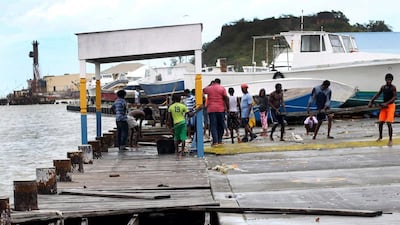"The storm is up, and all is on the hazard". The fury of the tropical storms that have barrelled, and are barrelling, their way through the Americas recalls Shakespeare's words. Everything that stands in their path is liable to fall. August closed with Hurricane Harvey slamming into Texas with a wind speed of 130 miles per hour. Seventy-one lives were lost and the resulting damage to property and infrastructure is estimated in the region of $70 billion.
September has begun with Hurricane Irma, a monstrous tropical cyclone fiercer than any of its forerunners in the Atlantic basin, sweeping through the Americas at a wind speed of 185 miles per hour, which it sustained for an unprecedented 37 hours. It will make landfall in Florida this weekend, but the devastation it has already caused en route in the Caribbean is terrifying to behold. Virtually every building on the island of Barbuda – one half of the tiny Caribbean state of Antigua and Barbuda – has been wrecked. Half the population in the island is now homeless and a two-year-old child is dead. Ninety-five per cent of St Barthélemy, the French overseas collectivity in the West Indies, is in ruins. Eleven people are dead and more than 100 are injured.
Haiti, the Dominican Republic, Bahamas and Cuba have all suffered losses. Evacuation efforts are hampered by ravaged roads and collapsed communication systems. Reconstruction will take years and cost billions. The United States, the richest and best equipped country in the world, is bracing itself for Irma. More than five million people are being evacuated from Florida. Just as our fears were being monopolised by the threat of war and nuclear apocalypse, nature has reminded us that it is the most awesome destroyer of all. Tens of millions in people in South Asia are still recovering from this year's cyclones even as hurricanes overwhelm the Americas. There is no respite. Hurricane Jose is expected to charge through the Caribbean at Category 5 speeds next week, deepening the misery of people already shattered by Irma.
Tropical cyclones are not caused by climate change, but the intensification of hurricanes, which feed off the warmth of surface waters, is almost certainly the consequence of a rapidly warming globe. President Trump has rightly been criticised for failing to prioritise action against climate change. He must demonstrate leadership in the aftermath of Irma.
Ultimately, however, only a global effort can help us, if not to immediately stop climate change, then at least mitigate its effects. The UAE has taken a lead in helping the victims of natural catastrophes. Dubai, under the auspices of International Humanitarian City, has already dispatched substantial humanitarian relief supplies to Haiti. It did the same last year. The UAE has also provided $10 million to help aid the reconstruction efforts in Texas following Hurricane Harvey. Others must follow the UAE's lead. The scenes of suffering in the Americas and South Asia should stir the world into collective action.
Follow The National's Opinion section on Twitter

